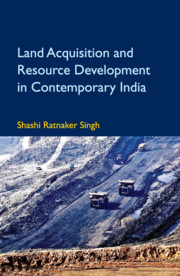Book contents
- Frontmatter
- Contents
- List of Figures
- List of Maps
- List of Tables
- List of Abbreviations
- Foreword
- Acknowledgements
- Part I Theoretical Framework
- 1 Introduction: From Colonial Regime to ‘Welfare State’?
- 2 State, Space and People
- 3 Land, Mines and Minerals
- 4 Land Acquisition and Resource Development in India
- 5 Resource Development and Compensation Issues
- Part II Case Study
- 6 Singrauli: A ‘Space’ of Dependence
- 7 Singrauli: A Development Dilemma
- 8 Administering Singrauli: Governance and Institutions
- 9 Land Acquisition and Its Socio-economic Implications: Field Survey
- Part III Analysis
- 10 Understanding Development
- 11 Conclusion
- Appendix: Memorandum from Mineral-Bearing States
- Bibliography
- Index
6 - Singrauli: A ‘Space’ of Dependence
Published online by Cambridge University Press: 16 October 2020
- Frontmatter
- Contents
- List of Figures
- List of Maps
- List of Tables
- List of Abbreviations
- Foreword
- Acknowledgements
- Part I Theoretical Framework
- 1 Introduction: From Colonial Regime to ‘Welfare State’?
- 2 State, Space and People
- 3 Land, Mines and Minerals
- 4 Land Acquisition and Resource Development in India
- 5 Resource Development and Compensation Issues
- Part II Case Study
- 6 Singrauli: A ‘Space’ of Dependence
- 7 Singrauli: A Development Dilemma
- 8 Administering Singrauli: Governance and Institutions
- 9 Land Acquisition and Its Socio-economic Implications: Field Survey
- Part III Analysis
- 10 Understanding Development
- 11 Conclusion
- Appendix: Memorandum from Mineral-Bearing States
- Bibliography
- Index
Summary
Resource Development and Regional Economy
The ‘space’ of Singrauli is ‘blessed’ with abundant natural resources, and the extraction of coal started during the colonial period. The capitalist class was familiar with these geographical strategic advantages and the potential benefits that could be derived from this region. From a political and economy point of view, it will be relevant to analyse the course of resource development in this region post-Independence and how the state–market nexus plays out in resource development projects. Historical discourse reflects how, during the post-Independence period, much before liberalization or introduction of a new economic policy in India, the state–market operated, economic powers influenced state policies and the path of resource development (Bardhan, 1997), and the ‘public purpose’ clause in the Land Acquisition (LA) Act of 1894 has been misused for serving ‘private’ interests. The chapter also demonstrates how certain resource-rich spaces, for instance, Singrauli, become a ‘space of dependence’ to serve public or national interest by largely neglecting regional costs and local development. Moreover, it is the people in such regions who bear such ‘costs’ (social and environmental) and subsidize the cost of resource development.
Political Economy of Singrauli: Initial Transition
During the late 1950s, Chaudhary Charan Singh – a renowned Indian political leader – for the very first time raised his concerns over the relationship between the state government of Uttar Pradesh (UP) and the Birlas (a known Indian corporation close to Gandhi) regarding the potential benefits and use of generated hydroelectric power from the Rihand Dam and the issue of prioritizing industry over agriculture, considering the status of Indian farmers and needs of the society at that time. It was Charles Betelheim who, in the early 1960s, suggested that in India, the central government was largely under the control of a national capitalist class, while the states were dominated by landed interests. In 1962, while inaugurating the Rihand Dam, Jawaharlal Nehru, in his speech, said, ‘Singrauli will one day become Switzerland of India.’ Thousands of people from the Singrauli region gathered to welcome Nehru, with the ray of hope that millions of families who lost their lands and livelihoods for the dam and reservoir will one day benefit as it was a project in ‘public interest’ and that the upcoming thermal power and mining projects in Singrauli will lead to regional development and transform their lives.
- Type
- Chapter
- Information
- Publisher: Cambridge University PressPrint publication year: 2021



